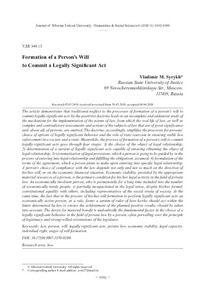Formation of a Person’s Will to Commit a Legally Significant Act
Скачать файл:
URI (для ссылок/цитирований):
https://elib.sfu-kras.ru/handle/2311/71668Автор:
Syrykh, Vladimir M.
Сырых, В.М.
Дата:
2018-06Журнал:
Журнал Сибирского федерального университета. Гуманитарные науки. Journal of Siberian Federal University. Humanities & Social Sciences;2018 11 (6)Аннотация:
The article demonstrates that traditional neglect to the processes of formation of a person’s will to commit legally significant acts by the positivist doctrine leads to an incomplete and unilateral study of the mechanism for the implementation of the norms of law, from which the real life of law, as well as complex and contradictory assessments and actions of the subjects of law that are of great significance and, above all, of persons, are omitted. The doctrine, accordingly, simplifies the processes for persons’ choice of options of legally significant behavior and the role of state coercion in ensuring stable law enforcement in a society and a state. Meanwhile, the process of formation of a person’s will to commit legally significant acts goes through four stages: 1) the choice of the object of legal relationship; 2) determination of a variant of legally significant acts capable of ensuring obtaining the object of legal relationship; 3) systematization of legal provisions, which a person is going to be guided by in the process of entering into legal relationship and fulfilling the obligations assumed; 4) formulation of the terms of the agreement, which a person plans to make upon entering into specific legal relationship. A person’s choice of compliance with the law depends not only and not so much on the direction of his/her will, as on the economic financial situation. Economic viability, provided by the appropriate material resources of a person, is the primary condition for his/her legal activity in the field of private law. An economically insolvent person, who is permanently for a long time included into the number of economically needy people, is partially incapacitated in the legal sense, despite his/her formal, constitutional equality with others, including representatives of the social strata of society. At the same time, the fact that in the process of his/her will formation to perform legally significant acts an economically active person, as a rule, forms a system of rules of how he/she should act within the limits determined by law to ensure the achievement of the planned positive results, should be taken into account. The desire for material benefit is undoubtedly the fundamental factor in the choice of a legally significant behavior in the field of private law by a person, often prevailing over the principle of legitimacy and strong-willed orientations of the legislator В статье показывается, что традиционное невнимание позитивистской доктрины к процессам формирования индивидами воли на совершение юридически значимых действий приводит
к неполному, одностороннему изучению механизма реализации норм права, из него выбрасывается реальная жизнь права, сложные и противоречивые, но имеющие первостепенное значение оценки и действия субъектов права и в первую очередь индивидов. Соответственно доктрина упрощает процессы выбора индивидами вариантов юридически значимого поведения
и роли государственного принуждения в обеспечении устойчивого правопорядка в обществе
и государстве. Между тем процесс формирования воли индивида на совершение юридически
значимых действий проходит четыре этапа: 1) выбор объекта правоотношения; 2) определение варианта юридически значимых действий, способных обеспечить получение объекта
правоотношения; 3) систематизация правоположений, которыми индивид полагает руководствоваться в процессе вступления в правоотношения и исполнения взятых на себя обязательств; 4) формулирование условий договора, который индивид планирует заключить при
вступлении в конкретное правоотношение. Выбор индивидом правомерного поведения зависит
не только и не столько от направленности его воли, сколько от экономического материального положения. Экономическая дееспособность, обеспеченная надлежащими материальными
ресурсами индивида, является первостепенным условием его юридической активности в сфере частного права. Недееспособный в экономическом отношении индивид, устойчиво, на протяжении длительного времени входящий в число материально нуждающихся лиц, является
ограниченно дееспособным в юридическом смысле, несмотря на его формальное, конституционное равенство со всеми, в том числе и представителями социальных слоев общества. Одновременно нужно учитывать, что экономически дееспособный индивид, формируя свою волю
на совершение юридически значимых действий, как правило, формирует для себя систему правил, каким образом, ему следует действовать в рамках, определенных законом, чтобы обеспечить достижение планируемых позитивных результатов. Желание материальной выгоды,
несомненно, является основополагающим фактором выбора индивидом юридически значимого
поведения в сфере частного права, нередко превалирующим перед принципом законности и волевыми установками законодателя
Коллекции:
Метаданные:
Показать полную информациюСвязанные материалы
Показаны похожие ресурсы по названию, автору или тематике.
-
Бесплатная квалифицированная юридическая помощь в России: теоретические и практические проблемы Т.В. Худойкина, С.Г. Евтеева
Худойкина, Т.В.; Hudoykina, Tatyana V.; Евтеева, С.Г.; Evteeva, Svetlana G. (Сибирский федеральный университет. Siberian Federal University., 2013-01)В статье рассматриваются правовые основы оказания бесплатной юридической помощи в России. Раскрываются основные характеристики и виды бесплатной юридической помощи. Анализируются теоретические и практические проблемы ... -
Некоторые пробелы в компетентности начинающего юриста
Шевченко, И.А.; Shevchenko, Ilya A. (Сибирский федеральный университет. Siberian Federal University., 2013-01)Фиксируются основные пробелы в профессиональной юридической компетентности студентов юридических вузов и начинающих юристов, указываются возможные причины этих пробелов, предлагается вариант решения соответствующей проблемы. -
On the Essence of Legal Obstacles to Exercising and Protection of Legal Rights and Interests: the Problem Statement
Panchenko, Vladislav Yu.; Petrov, Alexander A.; Tolstikh, Anna S.; Панченко, В.Ю.; Петров, А.А.; Толстых, А.С. (Сибирский федеральный университет. Siberian Federal University., 2014-07)Legal obstacles remain to be little-studied in the Russian legal studies, although the expressions “unhindered implementation”, “unhindered exercise” are used as set phrases. This article analyzes essential features of the ... -
Legal Life of Society as a new Category of Jurisprudence
Malko, Alexander V.; Малько, А.В. (Сибирский федеральный университет. Siberian Federal University., 2014-07)The article substantiates the necessity of giving a categorical status to the legal life of society and describes the notion of legal life, its characteristics and importance for theory and practice -
H.L.A. Hart’s Methodology of Defining Legal Concepts: Problems of Connection Between Semantics and Pragmatics in Legal Language
Kasatkin, Sergei N.; Касаткин, С.Н. (Сибирский федеральный университет. Siberian Federal University, 2018)The subject of this article is a method of jurisprudential definition introduced by a British philosopher and jurist H.L.A. Hart. In particular it discusses: (1) the author’s account of specificity of legal discourse ...

